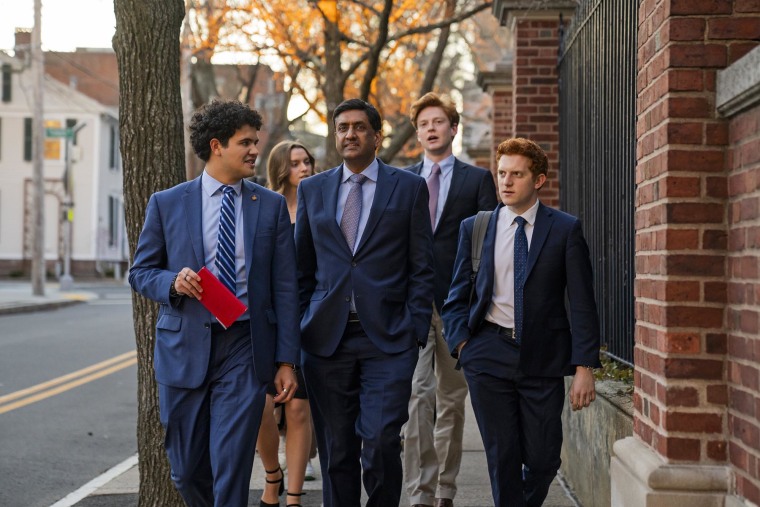A few hours after meeting with those students, it was Khanna, speaking with reporters on campus, fielding the questions and offering additional observations on his fellow Democrats.
He mentioned Sanders’ recent rallies with Ocasio-Cortez that have drawn large crowds and been seen by some as a passing of the progressive torch. He mentioned the marathon speech delivered by Sen. Cory Booker of New Jersey. He had a shoutout for Maine Gov. Janet Mills, who has been emerging as a leading voice opposing the second Trump administration.
But what about Whitmer, whose has made efforts to cultivate a working relationship with Trump? And what about California Gov. Gavin Newsom, who on his new podcast has been chopping it up with far-right Trump allies such as Charlie Kirk and Steve Bannon? Khanna initially tiptoed around those questions, hewing carefully to a talking point he offered several times that day during his meetings at Yale — that anyone interested in being a voice of the party must “push back” strongly on Trump and Vance.
Does he believe Newsom’s podcast strategy accomplishes that? Newsom’s conversation with Kirk, for example, was perhaps most notable for the governor’s break with other Democrats by arguing that it is “deeply unfair” for transgender girls and women to participate in women’s sports.
Joe Buglewicz for NBC News

“I’m all for having conversations, but I think it needs to be conversation with pushback. So, if you’re going to go and talk to Charlie Kirk, then ask him about some of the statements he’s made that are supporting white supremacists,” Khanna said. “Look, I went on Megyn Kelly’s platform and got eviscerated … for defending transgender rights.”
Khanna said he believes it’s important for Democrats to have “10 to 15 to 20 new voices” emerge ahead of the 2028 primaries.
“I think both the people who offer the most positive ideas going forward and the people who offer the most substantive opposition are going to be positioned to lead the party,” he said. “Our party became stale. The same personalities. The same talking points. The same consultants. And I’m excited that you’ve got a lot of new voices that are emerging.”
But Khanna also acknowledged it’s tough for progressive newcomers and outsiders to break through in a party where the establishment remains powerful. Joe Biden won the Democratic nomination — and the presidency — in 2020 despite challenges from Sanders and others on the left. Vice President Kamala Harris quickly sewed up the nomination in 2024 after Biden ended his re-election campaign and endorsed her and other party leaders followed suit.
“I mean, I was a co-chair of Bernie’s campaign. It would be naive to think that outsiders who are trying to push the boundaries with new ideas and new people aren’t going to be underdogs,” Khanna said. “But my sense is the thing that the party desperately needs is those outsiders.”
That prompted another question: Does Khanna want Harris to run for president again in 2028? He didn’t directly answer, but he spoke encouragingly about Harris running for governor instead.
“I think there’s a fair amount of support in California to be governor, and I’d be surprised if she’d even clear the Democratic field if she ran for governor,” Khanna said. “In terms of whether she wants to run for president again, that’s such a personal decision. I mean, if she feels like she’s the best person to lead the country in 2028, then she should run, and then the American people decide. But I would never tell someone whether to run or not to run. I think the only reason to run for president is if you think you’re the best person at that moment to lead the country.”